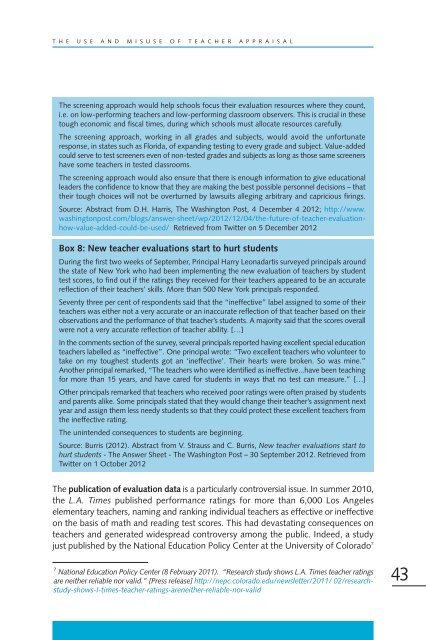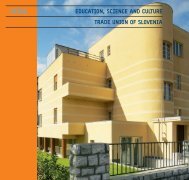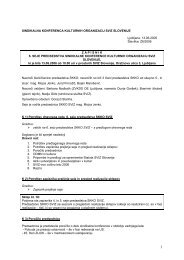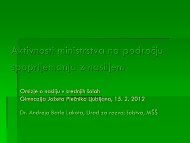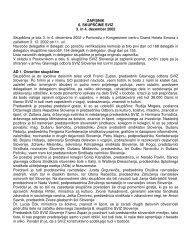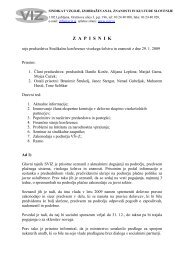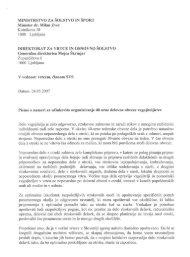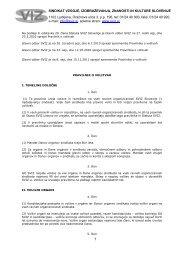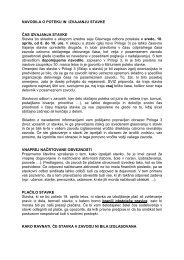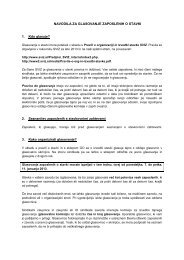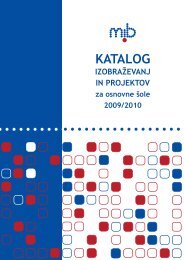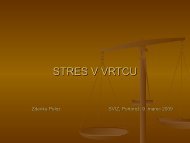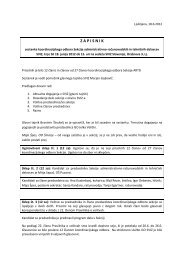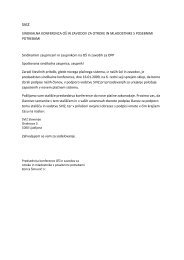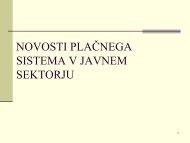The use and misuse of teacher appraisal - Education International
The use and misuse of teacher appraisal - Education International
The use and misuse of teacher appraisal - Education International
You also want an ePaper? Increase the reach of your titles
YUMPU automatically turns print PDFs into web optimized ePapers that Google loves.
T H E U S E A N D M I S U S E O F T E A C H E R A P P R A I S A L<br />
<strong>The</strong> screening approach would help schools focus their evaluation resources where they count,<br />
i.e. on low-performing <strong>teacher</strong>s <strong>and</strong> low-performing classroom observers. This is crucial in these<br />
tough economic <strong>and</strong> fiscal times, during which schools must allocate resources carefully.<br />
<strong>The</strong> screening approach, working in all grades <strong>and</strong> subjects, would avoid the unfortunate<br />
response, in states such as Florida, <strong>of</strong> exp<strong>and</strong>ing testing to every grade <strong>and</strong> subject. Value-added<br />
could serve to test screeners even <strong>of</strong> non-tested grades <strong>and</strong> subjects as long as those same screeners<br />
have some <strong>teacher</strong>s in tested classrooms.<br />
<strong>The</strong> screening approach would also ensure that there is enough information to give educational<br />
leaders the confidence to know that they are making the best possible personnel decisions – that<br />
their tough choices will not be overturned by lawsuits alleging arbitrary <strong>and</strong> capricious firings.<br />
Source: Abstract from D.H. Harris, <strong>The</strong> Washington Post, 4 December 4 2012; http://www.<br />
washingtonpost.com/blogs/answer-sheet/wp/2012/12/04/the-future-<strong>of</strong>-<strong>teacher</strong>-evaluationhow-value-added-could-be-<strong>use</strong>d/<br />
Retrieved from Twitter on 5 December 2012<br />
Box 8: New <strong>teacher</strong> evaluations start to hurt students<br />
During the first two weeks <strong>of</strong> September, Principal Harry Leonadartis surveyed principals around<br />
the state <strong>of</strong> New York who had been implementing the new evaluation <strong>of</strong> <strong>teacher</strong>s by student<br />
test scores, to find out if the ratings they received for their <strong>teacher</strong>s appeared to be an accurate<br />
reflection <strong>of</strong> their <strong>teacher</strong>s’ skills. More than 500 New York principals responded.<br />
Seventy three per cent <strong>of</strong> respondents said that the “ineffective” label assigned to some <strong>of</strong> their<br />
<strong>teacher</strong>s was either not a very accurate or an inaccurate reflection <strong>of</strong> that <strong>teacher</strong> based on their<br />
observations <strong>and</strong> the performance <strong>of</strong> that <strong>teacher</strong>’s students. A majority said that the scores overall<br />
were not a very accurate reflection <strong>of</strong> <strong>teacher</strong> ability. […]<br />
In the comments section <strong>of</strong> the survey, several principals reported having excellent special education<br />
<strong>teacher</strong>s labelled as “ineffective”. One principal wrote: “Two excellent <strong>teacher</strong>s who volunteer to<br />
take on my toughest students got an ‘ineffective’. <strong>The</strong>ir hearts were broken. So was mine.”<br />
Another principal remarked, “<strong>The</strong> <strong>teacher</strong>s who were identified as ineffective...have been teaching<br />
for more than 15 years, <strong>and</strong> have cared for students in ways that no test can measure.” […]<br />
Other principals remarked that <strong>teacher</strong>s who received poor ratings were <strong>of</strong>ten praised by students<br />
<strong>and</strong> parents alike. Some principals stated that they would change their <strong>teacher</strong>’s assignment next<br />
year <strong>and</strong> assign them less needy students so that they could protect these excellent <strong>teacher</strong>s from<br />
the ineffective rating.<br />
<strong>The</strong> unintended consequences to students are beginning.<br />
Source: Burris (2012). Abstract from V. Strauss <strong>and</strong> C. Burris, New <strong>teacher</strong> evaluations start to<br />
hurt students - <strong>The</strong> Answer Sheet - <strong>The</strong> Washington Post – 30 September 2012. Retrieved from<br />
Twitter on 1 October 2012<br />
<strong>The</strong> publication <strong>of</strong> evaluation data is a particularly controversial issue. In summer 2010,<br />
the L.A. Times published performance ratings for more than 6,000 Los Angeles<br />
elementary <strong>teacher</strong>s, naming <strong>and</strong> ranking individual <strong>teacher</strong>s as effective or ineffective<br />
on the basis <strong>of</strong> math <strong>and</strong> reading test scores. This had devastating consequences on<br />
<strong>teacher</strong>s <strong>and</strong> generated widespread controversy among the public. Indeed, a study<br />
just published by the National <strong>Education</strong> Policy Center at the University <strong>of</strong> Colorado 7<br />
7 National <strong>Education</strong> Policy Center (8 February 2011). “Research study shows L.A. Times <strong>teacher</strong> ratings<br />
are neither reliable nor valid.” [Press release] http://nepc.colorado.edu/newsletter/2011/ 02/researchstudy-shows-l-times-<strong>teacher</strong>-ratings-areneither-reliable-nor-valid<br />
43


